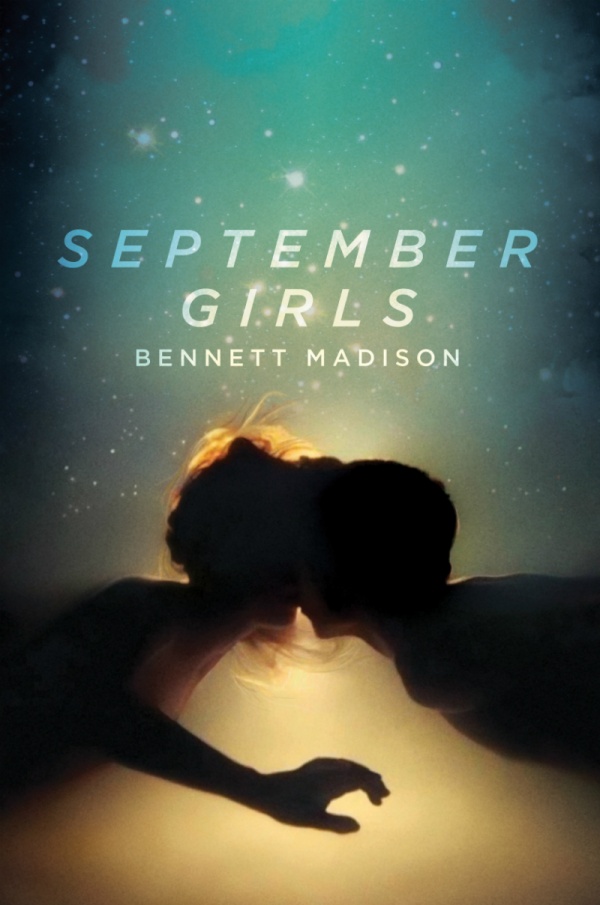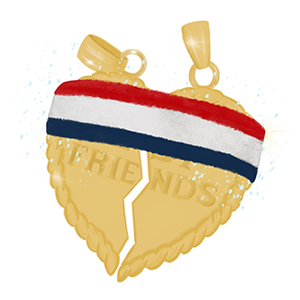
About the Book
-
Author:
- Bennett Madison
- Genre:
- Paranormal
- Voices:
- Cis Boy
- White (Non-Specified)
Cover Story: Gorgeous
BFF Charm: Eventually
Talky Talk: Subversive
Bonus Factors: Mermaids, Beach Summer
Relationship Status: Honeymoon Stage
Cover Story: Gorgeous
This is an underwater cover I can totally get behind. It’s spooky and dark, and the murky light shining up from the deep rather than down from the surface is sinister, rather than hopeful. One figure in the kiss is reaching out to the other, and it could be romantic, or just a little bit scary.
The Deal:
The summer after Sam’s mom takes off to live in a feminist collective, his dad suddenly packs Sam and his older dude-bro extraordinaire brother to spend the summer with him in a crappy rental at the beach. Once there, Sam can’t help noticing the girls—leggy, busty, parentless, teenage blondes who carry their porn-star bodies like bait for dangerous traps. And the girls notice Sam, hapless, foundering, dorky, virgin Sam, particularly one girl, Dee Dee.
BFF Charm: Eventually

Sam is not the most likable guy at the beginning of the book. He’s a teenage guy, not some book blogger’s wet dream of the perfect teenage boy, the boy she always imagined in high school but never met because he never actually existed. Just because he’s not sweet and sensitive and always saying just the right thing does not make Sam a bad character. He’s very male. He talks about his dick. He calls it a dick. He notices girls’ boobs. He desperately wants to have sex, but he’s scared. He feels stupid for being scared. He’s a lonely boy, with a douchebag older brother and douchebag friends, and while he quotes from them and mimics some of their vocabulary, he also knows they are total douchebags.
But go easy on the kid. How many of you truly chose your high school friends based on their critical thinking skills and empathy for others, and how many were friends by default with the kids you’d just always been friends with, or were friends of friends, or were on the same sports team or played the same musical instrument? I thought so. He’s a kid, a very real kid, who despises his brother’s attitude toward women, and knows his friend Sebastian (the source of the behavior) is an idiot. Sam’s growth over the summer is astounding, and the writing changes to reflect that. The way he sees his parents, his brother, the girls and himself becomes more rounded and full and fair.
Besides, who says you need to like a character in order to enjoy a book, to appreciate a story, or whatever? Not me, and definitely not Bennett Madison (or Margaret Atwood or Claire Messud, for starters).
Swoonworthy Scale: 3
This may sound strange, since sex is everywhere in this book, but sex really isn’t the point of the book. “But wait! What about that thing, you know, that has all the book bloggers so upset? That thing I’d mention because I don’t think it’s a spoiler but spoilerphobes might freak out on me, even though it’s pretty obvious from the beginning and I don’t think it’s meant to be a big reveal? That MAGICAL YOU KNOW WHAT business?” And yeah, that’s the surface plot of the book, but that’s kind of like saying Reese’s Peanut Butter cups are actually just chocolate (world’s worst analogy, sorry). The sex and pursuit of sex is just too honestly REAL for me to get excited by it. It’s too high school, too college, too, well, horny and hormone charged. And you know what? That’s a great thing. Number one, I’m an adult, thank god. Number two, I like when books are honest. So yeah, only a three, which is actually maybe too high, but what the hell. But I liked it that way.
Talky Talk: Subversive
In case you hadn’t gathered, I’m a bit annoyed at all the pitchfork-and-torches chatter about the sexism in this book. I don’t know if other reviewers ever finished the book, because one of my favorite things about the writing is how Sam’s voice slowly changed, deepening into near-maturity (sorry, couldn’t help it) as the book went on. The references to “pussy webs” (not Sam’s term, btw) and using the word “vagina” as an insult (also not Sam) mostly fade out, dropping away as Sam comes more into focus and stops being a passive reflection of those around him. Sam stops thinking constantly about what other guys tell him, and starts thinking about what he tells himself. All the characters, from Sam’s initially lame-ass dad to Taffany, a bit player in the story of the girls, go from being paper flat to fully fleshed.
I thought of the person I had been yesterday. I thought of who I was now and who I would be tomorrow and the next day and the next, and I realized that even though each of those people were different from the others, they all felt like me. I could draw a straight line from one to the next.
I’ve always loved Bennett Madison’s writing; I feel like it operates on a level you need to approach with humor, self-deprecation, and a pair of bifocals (and generous amounts of liquid eyeliner). This doesn’t always work in his favor, as readers frequently just don’t get it. It’s weird, and sometimes, there’s not something to get, or sometimes there are three different—and conflicting—things to get, and that’s one of the things that makes it awesome. So put on your postmodern, deconstructionist hat, the one you earned back in college seminars, grab a drink, and put a rubber band around your wrist so you can snap it and remind yourself to look for the joke, or to turn something on its head, whenever you start to get worked up. Take this:
My jeans were puddled at my ankles. I was standing there in just my white briefs. I tried to affect an air of defiance, but it was difficult; I suddenly remembered that the right butt cheek of this particular pair of underpants had a hole from washing them too many times.
Humiliate you? I wanted to say.
What I’m absolutely not saying here is, “Oh, lighten up. Don’t take it so seriously. It’s only a joke,” in the way asshole gropers or sexual harassers say it. That’s not what I’m saying. What I’m saying is sometimes we have to have our faces shoved into a trope or a stereotype in order to see it for what it is. The closest thing I can think of are the slur reclamation movements, where people appropriate negative words like “queer” or “ho” for themselves, and thus take the sting out of them. It’s not quite analogous, but maybe will help illustrate a mindset.
Bonus Factor: Mermaids

My normal reaction to mermaids is, “Uh, gross,” but I do love stories that stay true to the sharpened-teeth-and-blood-lust spirit of the old stories.
Bonus Factor: Beach Summer

This book completely captures the indolence and boredom and heat of an entire summer at the beach, with desperate parties and stifling humidity and crunchy sand carpets, and it’s lovely.
Relationship Status: Honeymoon Stage
I’m totally in love with this book, and as you can see, I will hear no bad things about it. Sure, I can see why some people might not find it as attractive as I did, but that’s okay—more for me. I want everyone to meet it, and feel like talking about it endlessly. It’s gorgeous and real and makes me think and laugh, and it feels like we have this little inside-jokey, exclusive club of two.
FTC Full Disclosure: I received my free review copy from the author. This review was originally posted on Kirkus Reviews in exchange for monetary compensation, which did not affect or influence my opinions. September Girls is available now.